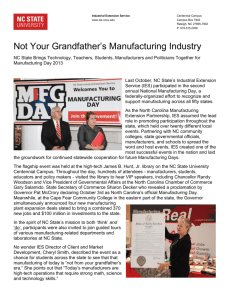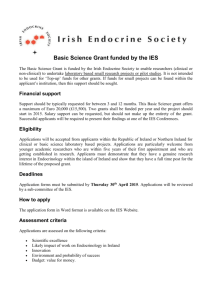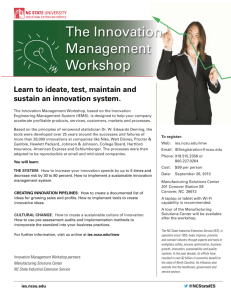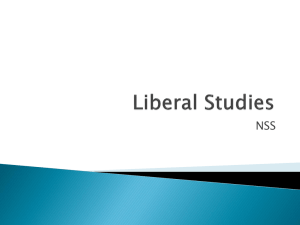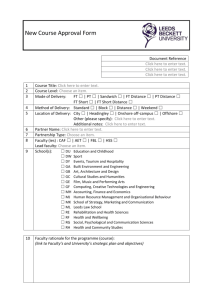Newsletter
advertisement
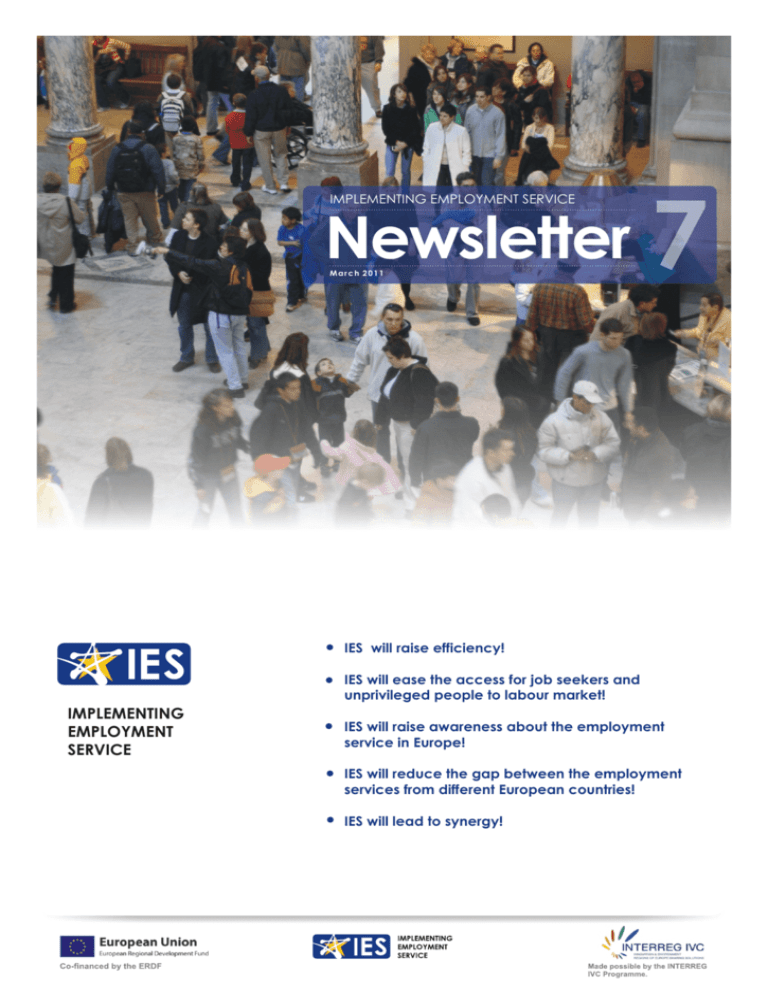
IMPLEMENTING EMPLOYMENT SERVICE Newsletter March 2011 IES will raise efficiency! IES will ease the access for job seekers and unprivileged people to labour market! IMPLEMENTING EMPLOYMENT SERVICE IES will raise awareness about the employment service in Europe! IES will reduce the gap between the employment services from different European countries! IES will lead to synergy! Newsletter March 2011 2010 2 7 PAGE: 2 Editorial Dear reader, Sonja Gavez The year 2011 is the last year of IES Project implementation. One of the key activities, WP 3 dedicated to transfer of experiences through Staff exchange, is approaching to its end. During last three months, the second phase of staff exchange has been implementing. Receiving partners with the support of donors organized several technical workshops and dissemination events with the purpose of promoting good practices, instruments and tools for improvement of ES systems to local stakeholders and other actors on the labour market, what is presented in this edition. And now, WP 4 “Transfer of good practices” starts. Through this activity IES partnership will raise awareness of policy makers on how important is the growing of capacities and skills deriving from the exchange of experience and transfer of good practise made possible due to the different realities. At this stage the feedback of the policy makers will be used to identify bottlenecks and to solve them in practise. Transfer and adaptation of good practices to the needs of local labour markets will improve employment services in all five thematic fields (Governance; Choice orientation; Labour demand -supply matching and job placement; Participation of unprivileged people to the labour market and Individual employability and self-employment). During next months, guidelines and recommendation on how to implement good practises to other European countries will be designed. IES brochure where IES project, its activities and IES partnership are presented in more details is already available at http://www.iesemployment.eu in English and Italian language. It will be also available in Spanish and German language, soon. Enjoy your reading. In this Issue >>> 1. IES Project 2. IES Transferring IES Good practices 3. IES Next activities 4. IES Dissemination Editor in Chief: Sonja Gavez Technical editor: Vasja Bajde Graphical design: Gorazd Gregoriè, Gazela, d.o.o. IES partnership, March 2011 Reproduction permited, provided the source is acknowledged. Sonja Gavez, Regional Labour Foundation Podravje (Slovenia) Newsletter March 2011 7 PAGE: 3 IES Project Steering Group Meeting in Logroño, Spain IES Management; Regional Employment Agency of the Autonomous Region of Sardinia (Italy) On March 22nd the partnership met in Logroño, Spain, in the premises of the IES Project has new manager National Training Centre for new technologies (Centro Nacional de Formación en nuevas tecnologías) for the fifth Steering Group Meeting. The Director of the Employment Service of La Rioja, Carlos Gonzalo Saínz, welcomed the partners and opened the working session. The meeting was particularly important as several crucial issues had to be discussed. In fact, the Staff Exchange phase is arriving to its conclusion and the following phase of “Transfer of Good Practices” is due to start. The next, and last, Steering Group meeting is planned to take place in Bucharest, Romania, on September 27th 2011. It will be the opportunity to discuss and finalize the last activities planned to be implemented within IES project. The dates for the 3 dissemination events - planned to take place in Logrono (Spain), Graz (Austria) and Cagliari (Italy) - were agreed for the month of June. Partners will be distributed to participate to one of the one-day events which will have the aim to disseminate information on the project and the results of its activities. In the afternoon a Technical Working Group meeting took place and several issues regarding the Staff Exchange phase were discussed in depth. Reports and Guidelines on this topic will be available soon on the project website. IES Project has new manager IES Partnership At the end of March 2011, after two and half years of successful project implementation, Mr. Luca Spissu left project and went to his new job. He was replaced by Mr. Enrico Garau from Regional Employment Agency of the Autonomous Region of Sardinia, Italy. We would like to thank Mr. Luca Spissu for his fruitful cooperation and contribution to the project success and especially to the interesting IES partnership. We would also like to say welcome to new project manager, Mr. Enrico Garau. Newsletter December March 20112010 6 7 PAGE: 4 Transferring IES Good practices Transferring Good practice Plan for Adaptation to New Economic Situation in Employment Services From November 22nd to December 3rd, 2010 took place in Logroño the 1st phase of the Staff Exchange planned within the project activities among the Province of Sassari, the Province of Oristano and the Servicio Riojano de Empleo. The delegations from Sardinian Provinces, both involved in transferring and implementing two different measures of the Good Practice named “Plan de adaptación a la nueva situación económica en los servicios de empleo" achieved by partner Riojano, had the opportunity in two weeks to experiment some aspects of the good practice through a direct involvement of the participant staff members in concrete activities of the Spanish partner. After the study visit carried out in La Rioja in February 2010, taking into account the project's timetable and some relevant aspects of the Sardinian and Riojano administrative systems, the Province of Sassari decided to transfer just a part of the good practice that is named Agent of Promotion of Local Employment (APEL) /Promoter of economic initiative. The Staff Exchange has been developed through a series of technical meetings and “in situ visit” that have allowed the delegation from the Province of Sassari to get the real framework wherein this professional figure carries out his tasks. Different important elements came out: the role of the local network that the Servicio Riojano de Empleo has built with all the stakeholders of its territory. In particular, the most impressive feature is the different role played by the APEL in promoting and spreading SRE services to local employers and, generally speaking, in implementing economic development through pre-existing local resources of each territory. The delegations from Sardinian Provinces, both involved in transferring and implementing two different measures of the Good Practice named “Plan de adaptación a la nueva situación económica en los servicios de empleo" achieved by partner Riojano, had the opportunity in two weeks to experiment some aspects of the good practice through a direct involvement of the participant staff members in concrete activities of the Spanish partner. The Apel operates within the Local Authorities, municipalities and their area, according to a Local Development Plan arranged by each City Council and funded by the SRE. This professional figure looks to have flexibility and competence in several areas, carrying out his activity in a different way, depending on the different local context. That is confirmed by the concrete cases of the City of Arnedo (Apel: Alfonso Perez), where the industrial context requires a local development plan based on the existing background (especially business services), and Ojon (Apel: Pilar Navarro Lainez), where the activity related to rural development and eco-tourism is predominant. Finally, an intermediate context is the case of Aldea Nueva de Ebro (Apel: Maria Jesus Gutierrez Garcia), as it includes both previous economic sectors. During the Staff Exchange, the Sardinian representatives spent some days at the Labour Office of Arnedo and at the Servicio Riojano de Empleo of Logroño, trying to get a best focus on this figure and learn about the strategy of the SRE to face the change economic scenarios (e.g: globalization and the international economic crisis). Newsletter March 2011 7 PAGE: 5 Transferring IES Good practices As argued by Dr. Gonzalo Carlos Sainz, Chief of Department of Industry, Innovation and Labour, the crisis could be a breathing space and an important chance of growth for all labour markets' actors. The Servicio Riojano de Empleo, cooperating with its network (the so-called Collaborative Entities (trade unions, non-profit organizations, employers' associations), Local Authorities and Educational Centres), is capitalizing the unfavorable economic situation to promote its employment services on the territory and leading a wide training campaign with the aim to get ready, both employers and citizens, for a possible and expected future economic change. An institutional workshop will be jointly held in May 2011 by Province of Oristano and Province of Sassari. Decision-makers, political and institutional actors at regional and local level involved in employment policies will be invited to the event. By Angleamaria Deidda, Province of Sassari (Italy) Territorial Employment Network Staff Exchange and Workshop in Oristano, Italy The good practice will promote at local level services provided by Employment service system, particularly towards enterprises and their associations, municipalities and local stakeholders. Within IES project, Province of Oristano decided to implement the good practice “Territorial Employment Network”. The purpose of the good practice is to enhance and consolidate the network with local stakeholders, moving from occasional and personal contacts to stable and formalized relations among local employment actors. The good practice does not represent a new employment service which will be added to those already provided by Employment service system, neither will substitute them. As it is stated in the application form of IES project, during Staff Exchange (WP3) donor partners, acting as tutors, will transfer their experience to receiving partners, involving them in daily activities, training on the job, writing draft plan of activities. Staff Exchange was divided in two parts, of which the first took place in Logroño in November 2010, while the second in Oristano in March 2011. On the first day donor and receiving partner carried out an analysis of the Employment services in Oristano and La Rioja, pointing out similarities and differences between the two systems. Two representatives from Servicio Riojano de Empleo attended the staff exchange in Oristano. On the second day the two partners discussed about practical issues related to the transfer of the good practice “Employment Territorial Network”. On the same day a press conference was organized to present the workshop to be held on the following day. Local televisions attended the press conference. Moreover a summary was sent to local radio and newspapers that published articles on the event. Newsletter March 2011 7 PAGE: 6 Transferring IES Good practices Objectives of the workshop were to present the good practice to local stakeholders and to ensure their involvement and commitment in implementing it. Approximately 30 people took part to the workshop, including the six Employment service centers of the Province of Oristano, representatives of entrepreneurial associations, Chamber of Commerce, municipalities, service centers for job placement of disadvantaged people, staff of Province of Oristano. Stakeholders who attended the workshop showed interest in the Spanish model and acknowledged the usefulness of implementing the good practice at local level. The Workshop with stakeholders took place on the last day of the staff exchange. By IES Team, Province of Oristano (Italy) Supporting Start-ups in Slovenia in Developing and Realisation of Business Ideas In the framework of the IES project, as a part of second ohase of staff exchange, the Technical workshop was held in Maribor, Slovenia, on the 15th March, 2011. Technical workshop was attended by 22 representatives of Ministry of Labour, Family and Social Affairs, Employment Services, municipalities of Podravje region, Chamber of Commerce and Industry of Styria, Pensioners' Organizations, Senior Associations, companies, etc. At the TW Spanish, presented good practice Senior Entrepreneurship Assessment Programme to local stakeholders. It was folowed by presentation of Senior programme's transfer and adaption to local needs by Austrian and Slovene partners. SENIOR Programme is a service, in which retired businessmen, professionals (seniors) from different business areas, with extensive business knowledge and experiences, on the volunteering basis advise to graduates from University of Murcia at achieving their business ideas. By transferring their knowledge and experiences the retired tutors keep their active role in society and at the same time they also learn from young entrepreneurs. Programme is adjusted to individuals' needs as individual entrepreneur is advised by the group of tutors from different business areas at achieving concrete business ideas. Project partner FH Joanneum, University of Applied Sciences from Graz, Austria, is already transferring the Senior Programme, adapted to Austrian labour market and students needs, pilot project with 2 mentors and development of 3 business ideas. The Senior Programme that was developed by the project partner FUERM, Spain and has been succesfully implemented in Murcia for twelve years, was presented by FUERM representative, Mrs. Consuelo Garcia Sánchez. Regional Labour Foundation Podravje has been acquainted with the Programme during the study visit in Spain and has recognized it as a good practice for transfer and adaptation to the labour market conditions in Slovenia, due to its high level of successfulness and low costs of implementation. Newsletter March 2011 7 PAGE: 7 Transferring IES Good practices In Slovenia the programme will mainly target the group of young unemployed people with a minimum of V. level of education, wishing to realize their business ideas, create the company and new jobs. Acording to Employment Service of Slovenia data, the quarter of unemployed in Slovenia is aged between 18 to 30 years. If we want to increase the number of entrepreneurs in Slovenia, reasonable adjustment of measures to the target group, removal of obstacles and adequate motivation will be needed. Support and assistance at growth and development, especially in the first three years of operation, when the new companies are very vulnerable, is essential. The Senior proframme transfer and its adaptation was presented by FH Joanneum representatives, Mrs. Bernadette Frech and Mrs. Katrin Wallner. On the other hand, active ageing is a current social topic in Slovenia as well as in other european countries, as the population is ageing, life expectancy is getting longer, working activity is extending and we are more and more aware of the importance of working activity even after retirement. Ageing of the population requires different approaches and measures, by which (in)formal activity of elder is extended to the »third age«. This raises the quality of life of older people and economic sustainability of the country. Senior Programme in Slovenia will contribute to improved and more accessible counselling offer for the entrepreneurs-beginners, to increased entrepreneurial activity and by that to increased (self)employment and decreased unemployment in Slovenia. Mentoring support after business creation (another two to three years) raises the interest for enterprising, increases entrepreneurs selfconfidence and ability to take risks and also increases creativity and innovativeness. On the other hand, also the mentors gain, as they remain working active also after retirement as well as they can also learn a lot from young entrepreneurs (especially on the area of ICT). It is therefore the process of intergenerational learning. The idea of Senior Programme adaptation and transfer to Slovenia was presented by Regional Labour Foundation Podravje representative, Mrs. Sonja Gavez. Austrian partners (FH Joanneum) also presented the project EMA (Entrepreneurship Mentoring Academy), for which the application was submitted in the framework of the programme Leonardo da Vinci. The main aim of this project is creating the European mentoring academy (5 mentors per all partner's countries: Slovenia, Austria, Spain, Iceland, Turkey) that supports young entrepreneurs in the business creation process. In active discussion the participants concluded that Senior programme can contribute to entrepreneurial culture improvement as well as to the development of entire community through intergenerational connection. Employment Service supports the idea to select »important« seniors, whose name means something in the region or locally, which can be advantage or »guarantee for success«, as for example in Murcia, where young entrepreneur can obtain the necessary funds in the bank (loan) on the basis of business plan, verified by senior tutors. The participants emphasized the importance of connecting the already existing programmes and measures, using the already existing instruments, therefore the cooperation on all levels is needed. The participants see the possibility of cooperation especially between Employment Service, University Career Centres, Venture Factory etc. The support and the interest of banks to co-finance the development of social entrepreneurs can be expected due to Law on Social Entrepreneurship adoption. Regular weekly meetings of Pensioners' Organizations members, quite active in Slovenia, can be used as the possibility to promote the Senior Programme. By Sonja Gavez and Dušanka Lužar Šajt, Regional Labour Foundation Podravje, (Slovenia) Newsletter December March 20112010 6 7 PAGE: 8 Transferring IES Good practices Transferring S.P.O.T from Sardinia to Ilfov A Way to Increase the Quality of Employability The reason for having chosen this best practice is the need of elaboration of project employment projects in Ilfov. As the rate of unemployment in Ilfov is the lowest in Romania, the best practice to be transferred should be one meant to create a frame for the deepening of the professional formation and not necessarily one meant to be directed only to the urgency of employment, especially for the students who are preparing themselves for their future jobs. Ilfov County Council has chosen as best practice to be transferred S.P.O.T. (Sportello Polifunzionale di Orientamiento e Tutoraggio), implemented by The Regional Employment of The Autonomous Region of Sardinia. The project SPOT is a labour active policy, that uses the vocational training as instrument of matching offer and demand. It is meant increase competences and technical skills and the employability of unemployed people. In S.P.O.T the vocational training was only in private enterprises localized in the Municipality of Cagliari and in its industrial area. It is aimed at letting people understand which job they like to do and to increase their competences and employability skills. The target is also related to: ! The practical aspect of the best practice- in Romania, there is the need of increasing the practical abilities of the people who are oriented to certain jobs. The lack of this practical experience is a gap that should be successfully filled with the model promoted by S.P.O.T. ! The involvement of the private companies in the formation of the unemployed people, or of the young people who otherwise would difficultly find jobs shortly after their graduation. ! Bucharest, Romania The elaborations of the documents of the implementation and of the guidelines for the students who are to be part of the project represent a main part of the transfer at this moment. The elimination of distances and barriers between the private sector, the public sector, including the educational system and the public administration bodies. IAt this moment, the transfer of the best practice is focused on harmonizing the differences between the legal backgrounds between two administrative entities (Sardinia and Ilfov). The difference leads to a transfer of the good practice that should be adapted to the Romanian legislation. For instance, choosing a group of students instead of short term or long term unemployed people shows up as a solution for overcoming some difficulties in the implementation of the transfer. Gina Serbanescu, Ilfov County Council (Romania) Newsletter March 2011 7 PAGE: 9 Transferring IES Good practices How to transfer a Job fair from Sassari, Italy to Murcia, Spain? FUERM has already carried out many contacts, meetings and activities in order to test and implement some of the transferable measures in the Job Fair to be hold in Murcia in April 2011 and then, FUERM will evaluate the impact of the first piloting test in order to improve the transfer for future editions of Job Fairs in Murcia (twice per year). Many regions already organise job fairs but WORKEY, the Job Fair of the Province of Sassari (Italy), has been locally an example of concrete active labour market measure able to fit different goals at the same time. The involvement of a wide number of stakeholders allowed to develop local and extra-local networks; to spread information and to promote new PES services (job-matching, counselling and choice orientation and so on), to make so that unemployed people can familiarize with active job search techniques, have enhanced their employability in general and have implemented the chance to find a proper job opportunity, thanks to a new support services from PES. For all these reasons, FUERM decided to transfer key aspects of WORKEY to the job fairs that traditionally FUERM organises in the Region of Murcia (Spain). As part of the transfer, FUERM has improved the methodology to contact and animate companies to take part in the fair and the collaboration links with other regional institutions dealing with employment affairs have been strengthened. In parallel, new methods to attract job seekers have been implemented. On the other hand, during the job fair, new free services for participating companies have been planned: companies presentations, pre-selection of candidates for a position with the possibility of holding face to face interviews, business breakfast with human responsible with networking purposes, etc. Senior participating at Job fair in Murcia By Consuelo García, University Enterprise Training Partnership of the Region of Murcia (Spain) Newsletter March 2011 7 PAGE: 10 Transferring IES Good practices Study Visit Graz, Austria for the Implementation of the “Mentoring Programme” In the frame of a lecture of Ms. Bernadette Frech, Ms. Sánchez had the chance to present first the IES project to a group of students and in a second step also explained the “Mentoring Academy” and its main aims to them. In the frame of the IES project FH JOANNEUM transfers the “Mentoring Academy” from FUERM (La Fundación Universidad Empresa de la Regiónde Murcia). This academy aims at increasing entrepreneurial activities within the region of Styria which are rather low compared to other European countries. This aim should be accomplished with the proposition of highly professional consultancy and advice service by retired and active professionals that deliver valuable and extensive expertise in different areas of business to university students and job seekers during the critical phase of the business creation. As the measure exchange is already in the implementation phase and therefore Ms. Consuelo García Sánchez, one of our partners from FUERM came to Graz/Austria from the 14th until the 18th of March 2011 to monitor the ongoing process which is made by the team of FH Joanneum concerning the implementation. The team of FH Joanneum and Ms. Sánchez worked in many team sessions in order to discuss the steps which have been already taken and therefore received feedback. The further implementation of the measure got also discussed in a very detailed way in order to follow the guidelines of the project. The attendees of the lecture then needed to get together in order to work out business ideas which then needed to be presented in front of Ms. Frech, Ms. Wallner and Ms. Sánchez who functioned as jurors and then selected the best business ideas which are now going to be implemented in the frame of the course taking place in the study programme of “IT, Law and Management (IRM)” at FH Joanneum. All in all the meeting was very successful as the further steps for the implementation of the measure got concluded and the programme was once more presented to the target group. By Bernadette Frech, Claudia Linditsch, Katrin Wallner and Rene Wenzel, University of Applied Sciences Graz (Austria) Newsletter March 2011 7 PAGE: 11 IES Dissemination Fostering entrepreneurial thinking and acting among students and alumni at FH Joanneum Public Series of Lectures about Entrepreneurship at FH JOANNEUM In the frame of the IES project FH JOANNEUM transfers the “Mentoring Academy” from FUERM (La Fundación Universidad Empresa de la Región de Murcia). This academy aims at increasing entrepreneurial activities within the region of Styria which are rather low compared to other European countries. This aim should be accomplished with the proposition of highly professional consultancy and advice service by retired and active professionals that deliver valuable and extensive expertise in different areas of business to university students and job seekers during the critical phase of the business creation. Senior participating at Job fair in Murcia Events are also used to disseminate the IES. At the first lecture 143 out of 180 registered people participated and listened excited to the lecture of Mr. Faschingbauer and all got informed about the project IES and the “Mentoring Academy”. FH JOANNEUM was able to organize three public lectures about entrepreneurship among which two mentors of the “Mentoring Academy” who are Mr. Faschingbauer and Mr. Auer participate. For these events stakeholders and students got invited in order to gain the essential input and to participate actively during the discussions. The first lecture by Mr. Michael Faschingbauer took place on the 4th of March 2011. Mr. Faschingbauer is a business consultant, associate professor and author of the management book of the year 2010 which is called “Effectuation: Acting instead of Planning”. The lecture mainly focused on the explanation of the effectuation theory which states that entrepreneurial acting and thinking can be learned and that entrepreneurial success is not dependent on ingenuity and luck but on the actions set by oneself. Two further lectures are going to take place on the 1st of April and on the 6th of May 2011. On the 1st of April 2011 Thomas Offner who is the co-founder of “Groupon” in Austria and Switzerland will talk about his entrepreneurial experiences which he is going to underline with practical examples. Then on the 6th of May 2011 Günter Auer who was the executive director of “Auer Waffles” and is the executive director of “Bärenland” is going to talk about his profound experience as an entrepreneur and about the characteristics an entrepreneur should have in order to be successful. As we hope that the positive trend will continue, the team of FH JOANNEUM expects 400 participants during all three lectures which would be a huge success. By Bernadette Frech, Claudia Linditsch, Katrin Wallner and Rene Wenzel, University of Applied Sciences Graz (Austria) Newsletter March 2011 7 PAGE: 12 IES Next activities Fostering entrepreneurial thinking and acting among students and alumni at FH Joanneum During this last step through the project finalization partners will be involved in different activities covering all the main project issues: communication, dissemination and, of course transfer of experiences. Finally, 2011 not only represent the last year of the project but a concentration of crucial and important activities that have to summarize all what has been done and, last but not least, reach the main goal of the project of improving the efficacy in implementing the Employment Policies at regional level supporting the accomplishment of the Employment Local Strategies. As far as communication and dissemination activities are one of the main important issues of Interreg IV projects, during the first half of 2011, partners are involved in deepening the knowledge about the realised activities till now through the organization of 3 dissemination events, taking place in Spain Logroño, Italy Cagliari and Austria Graz, having as objective the diffusion of what has been done during the staff exchange and in general on project activities, 2 new number of IES newsletter will be published and disseminated while in the second half of the year the entire partnership will be committed in the organization and realization of the final Conference, crucial event where present and disseminate the final results. Moreover, all the planned activities have the purpose of spreading all the key messages and disseminate outputs produced and achieved results within project activities and mostly component 3 Exchange of experiences. Regarding this last point, IES is in its crucial phase of finalizing staff exchange and give course to the final step of the project consisting in the transfer of the experiences among the selected practices. The concrete transfer of the practices represent the great challenge of the project for all the partners and the most important result to achieve; at the same time there will be a strong effort to define recommendation, thanks to the acquired knowledge, on how to implement good practices to make out the most of the Employment Service System in European countries. By Annamaria D'Angelo, Regional Employment Agency of the Autonomous Region of Sardinia (Italy) IES Key Messages IES will raise efficiency! The Employment Service System in partners' countries will be improved. Trough IES partnership, exchange of experiences, transfer of good practices and capacity building the competences of staff will be improved and more efficient services will be provided to unemployed and companies. IES will ease the access for job seekers and unprivileged people to labour market! IES project with its activities will contribute to favouring the access of job seekers at the local, national and European labour market. The employment instruments will be improved and local/regional employment strategies will be designed to create new jobs and increase employment possibilities for job seekers and unprivileged people at labour market. IES will raise awareness about the employment service in Europe! Provincia di Oristano The awareness about employment service in Europe will be raised. By disseminating IES project' results trough different dissemination events and by active involvement of key local stakeholders to IES workshops, seminars, conferences the recommendations for improvement of Employment Service System will be mainstream to local/regional/national labour market policies. IES will reduce the gap between the employment services from different European countries! By bringing together different countries with specific experience, IES will help solve the problems that countries have in understanding European structures which are based on national systems. Through this type of exchange of experience partners interact directly in order to improve their capacities and to reduce the distance between them and their partners. IES will lead to synergy! IES Project ensures the transfer of good practices from the project partners towards other similar institutions from each partner's country. By organizing different manifestations each partner can share the experience gathered during the life cycle of the project and in this way make the results of the project sustainable. The content of this publication is the sole responsibility of the IES partnership and it does not represent the opinion of the European Commission. The Commission is not responsible for any use that might be made of information contained herein.

